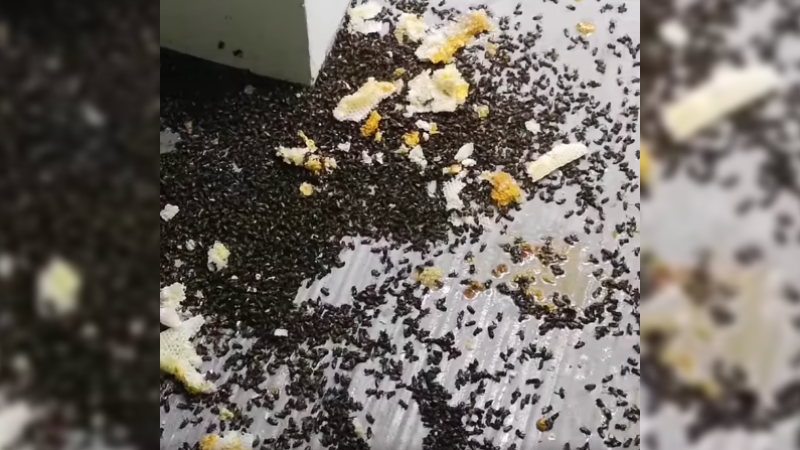A beekeeper on a mission to save as many bees in Singapore was a few minutes late to rescuing a colony from extermination earlier this week – much to his dismay.
Xavier Tan, the founder of bee conservation group Nutrinest, told Coconuts today that he had rushed down to check on a large beehive at a public housing block in Sengkang on Monday, after receiving an alert from a resident. But when he arrived, the bodies of what looked like tens of thousands of bees were already strewn across the floor after being hosed down with chemical repellent, either dead or struggling to stay alive.
“Maybe two minutes before I reached, [the resident] called me saying that the pest control is here. So I decided to maybe just drop by and see how they do it. When I was there they were spraying and destroying the hive so I took a video,” the 53-year-old said. He has been a beekeeper for 13 years.
He shared a video of the “war zone” online that also showed pieces of honeycomb spread across the floor. Other clips shared by Tan showed a pest control worker holding a long pole that had a repellent attached to its end, and using it to spray and prod at the hive. Town councils normally contact pest control specialists to deal with such complaints.
“I decided to post this video [separately] as this one is even more heart[breaking]. You can [witness] the suffering of the bees on the floor and [it’s] really like [a] war zone,” he wrote.
Why bees are important
Bees are the “keystone species” of the ecosystem, Tan said. As pollinators, bees produce food for the wildlife and propagate plants in the environment, making it more “livable” for humans and animals. Without them, wild animals like monkeys, otters, and snakes may invade our homes for food due to scarcity in the wild, he said.
“We are going to have great trouble because imagine if there is no food in the forests and we start growing a lot of plants in our neighborhood, all these animals will start to invade our areas,” he said. “It’s better that we start doing something to actually kind of commonize bee conservation instead of being afraid and wanting to kill them.”
Tan hopes that more people would alert him to beehives when they see one so that he can remove them properly, and take a video of them from afar when they do. The bees will not sting you if you don’t disturb them, he said.
Instead of killing the bees, Tan will locate and move the queen bee into a container so that the rest of the colony can follow. He will then remove the honeycomb completely, leaving no traces that could attract other bees. Tan transfers the rescued colony to one of his three gardens located in Sembawang, Jurong, and Orchard to join around 30 other hives he tends to.
He has been getting more rescue calls since the pandemic hit. Tan could be removing up to four hives on a busy day.
“I am seeing an increase in requests of people who ask me to help them resolve this problem. I’m not sure if it’s due to the current COVID situation. Maybe it is because when we have lesser activity then the life of nature will live up again,” he said.
View this post on Instagram
Other stories you should check out:
Those who complete Pfizer, Moderna vaccination can gather in larger groups by end-July
Singapore teen handed probation over death threats to Premier League footballer
Driver who missed a turn dangerously reverses on busy Braddell Road (Video)




